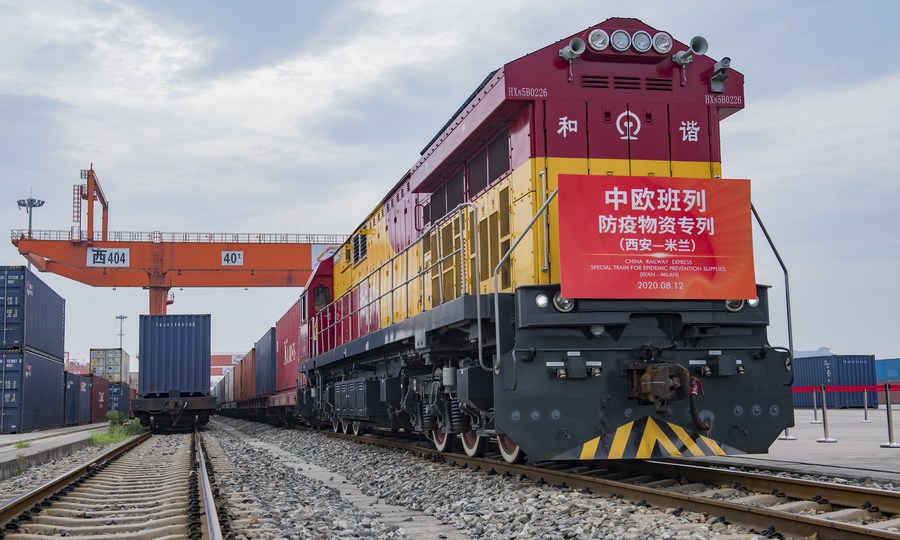China-Europe rail links boost pandemic recovery


Severely affected
General manager of Henan Curry Supply Chain Management, Wang Tao, said that in April alone, he booked two trains, each with 43 standard cargo containers, for a local factory to send medical supplies from Zhengzhou to Hamburg, Germany, and to Moscow, the Russian capital.
Wang, whose main line of work is international logistics, said his business has been severely affected by the pandemic, and many of his clients now favor rail services instead of sending goods by sea or air.
"Ships, which are obviously slower than trains, have been frequently delayed or halted during the pandemic. Our products were once stuck in a port for more than a month, upsetting our overseas retailers, as they were unable to receive the products on time," he said.
Wang added that it takes 34 to 40 days to transport goods from Zhengzhou to Hamburg by ship, but only 16 to 18 days by rail, and the latter services are also reasonably priced.
"From March to July, the volume of rail freight to Europe we arranged for clients was double that for the same period last year, while shipping and air volumes were down by nearly 50 percent on last year," he said.
Axel Mattern, joint CEO of Port of Hamburg Marketing, said he has also witnessed a surge in the frequency and volume of goods carried by China-Europe freight trains this year.
Some 200 such trains running from Chinese destinations to Hamburg are available.
"Despite the COVID-19 pandemic, rail traffic between China and Hamburg rose in January and into March and April. The volume of imported and exported goods is picking up and we are also making new connections with inland ports in China," Mattern said.
He added that Hamburg is "China's Gateway to Europe", as it is an important port for Chinese goods reaching the continent before they are distributed to destination countries such as Spain, Italy, France and the Czech Republic.
Last year, the Port of Hamburg handled about 9 million TEUs (twenty-foot equivalent units) of freight and more than 136 million tons of cargo. Some 2.7 million of the TEUs were from China.
Mattern said global shipping capacity this year has been greatly reduced and air traffic largely halted due to the pandemic. As a result, many customers have chosen rail freight services as an alternative mode of transportation.
Rail freight has also been an effective way to transport medical supplies such as face masks to help European countries fight the outbreak, he said.
He added that rail and shipping freight businesses have started to pick up, especially those in China and elsewhere in Asia, as many countries throughout the world have eased coronavirus restrictions to rescue their economies.
Although rail freight still lags behind its marine counterpart in terms of the quantity of goods being transported, it "definitely plays an important role" in boosting economic ties and trade between China, Germany and other European countries, he said.
"The signs are quite good. Our port is busy and we are getting more trains and ships. The economic forecast, especially for Sino-German business relations, is very good, according to reports from many institutions."
More Chinese cities are launching rail freight links to Europe.
A new line is operating between the Guangdong-Hong Kong-Macao Greater Bay Area in southern China and the German city of Duisburg. The first train to operate on the line, carrying electronic products, machinery and textiles, departed from Shenzhen, Guangdong province, on Aug 18. Five days later, it left China through the Alataw Pass, a major rail port in Xinjiang.
On Aug 26, Luoyang city, Henan, launched its first China-Europe rail freight service when a train loaded with tractors left for Barnaul, Russia-a journey of about 20 days.
With rail freight traffic rising, the National Development and Reform Commission recently allocated 200 million yuan ($28.6 million) to support construction of transportation hubs in five cities to improve services between China and Europe. The cities are Zhengzhou, Chongqing, Chengdu, capital of Sichuan province, Xi'an, capital of Shaanxi province, and Urumqi, capital of Xinjiang.
Cui Hongjian, director of the Department of European Studies at the China Institute of International Studies, said economic development worldwide after the pandemic will depend considerably on market efficiency and global industrial supply chain security.
China-Europe freight train services, which have remained stable and shown great potential during the outbreak, could meet the requirements of such development, Cui said.




































